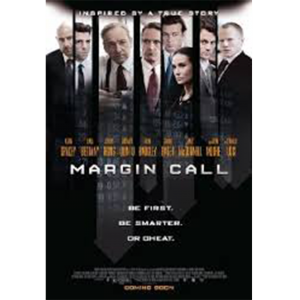 Inspired by the 2008 financial meltdown, Margin Call explores capitalism, greed and investment fraud.
Inspired by the 2008 financial meltdown, Margin Call explores capitalism, greed and investment fraud.
The film takes place over a 36-hour period at a large Wall Street investment bank and highlights the initial stages of the recent financial crisis.
The opening scene shows the trading empire brutally laying off employees. One of the victims is middle-aged financial analyst Eric Dale (Stanley Tucci) who, before being escorted out of the building, hands his now former employee Peter Sullivan (Zachary Quinto) a USB memory stick containing a top-secret research project revealing the company’s future is on the brink of the biggest bank breakdown of all time. Due to its toxic assets, the whole firm could go entirely bankrupt at any moment.
 From then on in, it’s a race against time to fight against the financial downfall. An all-night crisis meeting is held to decide on which measures should be taken to protect their own wealth. A roller-coaster ride ensues as decisions both financial and moral propel the lives of all involved to the verge of disaster.
From then on in, it’s a race against time to fight against the financial downfall. An all-night crisis meeting is held to decide on which measures should be taken to protect their own wealth. A roller-coaster ride ensues as decisions both financial and moral propel the lives of all involved to the verge of disaster.
It shows the essence of what it means to be involved in the high stakes world of the financial industry. It may seem fun, and some-what glamorous but it comes with huge sacrifices and massive dilemma. These are the people who make decisions that shape our global future and subsequently destroy hundreds of lives by the impending credit crisis. Carrying a huge weight on their shoulders would be a colossal understatement.
There are some brilliant scenes of fear and self loathing amongst the New York bankers. We witness them being able to somehow act a kind of tenderness towards colleagues while threatening them at the same time. This maybe a metaphor of the financial world as a whole, showing the reason behind the economic bust is down to the morally corrupt people themselves. Trust no one, trust nothing.
 Division head, Jared Cohen and CEO John Tuld agree that the best plan is for the firm to quickly sell all of the toxic assets before the market can react to the news of their worthlessness, limiting the firm’s exposure. However, floor head Sam Rogers suggests that dumping the firm’s toxic assets will spread the risk throughout the financial sector and will destroy the firm’s relationships with its counterparties. Rogers also warns Cohen that if the firm is only selling the toxic mortgage-backed securities ad will not barter or swap one for another, the customers will be suspicious and will quickly become aware of the firms mishaps. The characters eventually persuade Dale to come in and help matters.
Division head, Jared Cohen and CEO John Tuld agree that the best plan is for the firm to quickly sell all of the toxic assets before the market can react to the news of their worthlessness, limiting the firm’s exposure. However, floor head Sam Rogers suggests that dumping the firm’s toxic assets will spread the risk throughout the financial sector and will destroy the firm’s relationships with its counterparties. Rogers also warns Cohen that if the firm is only selling the toxic mortgage-backed securities ad will not barter or swap one for another, the customers will be suspicious and will quickly become aware of the firms mishaps. The characters eventually persuade Dale to come in and help matters.
They scramble, ultimately unsuccessfully, to manage the financial and public panic that ensued when their problems became apparent and the global financial markets plunged as a result.
J.C. Chandor’s first feature film offers a frank portrayal and a brutally honest critique of the global financial reality and turns it into a gripping, thought provoking drama. A must-see for all business figures.
